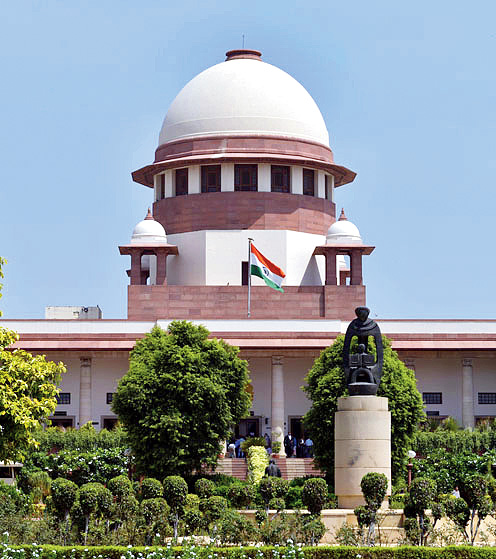A former Delhi High Court judge on Tuesday wrote to President Ram Nath Kovind seeking his intervention following the Supreme Court collegium’s alleged decision to recommend the elevation of a high court judge to the top court, superseding 32 other judges of various high courts.
Justice Kailash Gambhir in his letter said the collegium’s January 10 decision to recommend Justice Sanjeev Khanna, a Delhi High Court judge, was “appalling and outrageous”.
The five-member collegium of Chief Justice of India (CJI) Ranjan Gogoi and four other senior-most judges — Justices A.K. Sikri, S.A. Bobde, N.V. Ramana and Arun Mishra — had recommended Justice Khanna’s name along with that of Karnataka High Court Chief Justice Dinesh Maheshwari.
President Kovind is yet to clear the recommendations.
Justice Khanna is the nephew of Justice H.R. Khanna, a former Supreme Court judge who was overlooked for the post of CJI by then Prime Minister Indira Gandhi during the Emergency.
The judge, who had ruled that fundamental rights could not be suspended even during periods such as the Emergency, was superseded by Justice M.H. Beg, who was junior to him.
Justice Gambhir, in his letter, said the collegium’s decision to recommend Justice Sanjeev Khanna amounted to “casting aspersions” on the “merit” of those who were being overlooked.
“This is appalling and outrageous that such an earth-shattering decision has been taken to supersede as many as 32 judges (in various high courts) which include many chief justices, casting aspersions on their intellect, merit and integrity,” the letter said.
“The talk in the legal corridors is that the elevation of Justice Khanna is with a view to pay respect to the legacy left by his great uncle and is a tribute to his great ideals, principles and judicial philosophy and most of all to the courageous stand taken by him in the habeas corpus case,” the letter said.
Justice H.R. Khanna was the lone dissenting judge on a five-member bench in that Emergency-period case that ruled that freedom was regulated, not abstract or absolute.
Justice Gambhir also recalled last year’s January 12 unprecedented press conference that four senior-most judges of the Supreme Court had then held, accusing then CJI Dipak Misra of acting in an arbitrary manner. The four judges included Justice Gogoi, the current CJI.
“I humbly urge your Excellency to kindly ponder over as the head of the largest democracy in the world with a robust judiciary and having remained a part of the legal fraternity, and see yourself that the way the present collegium of five eminent senior judges have superseded almost 32 judges, how will the democracy and independence of judiciary in the country survive.
“It cannot be forgotten, that it is just one and half month back the collegium members of the Supreme Court had superseded Hon’ble Justice Dinesh Maheshwari and now out of the blue he becomes more deserving and suitable within such a time,” the letter said.
According to reports, Justice Maheshwari was not considered for elevation when the collegium met in December.
Sources in the Supreme Court said the controversy was part of an orchestrated campaign by a retired member of the collegium whose plea for transferring his “favourite” judge to a high court had been rejected by the collegium at the January 10 meeting.
The sources said it has never been the practice of the collegium to pick judges for elevation on the basis of seniority alone. They pointed out that in 2017, two current top court judges, Justices Abdul Nazeer and M. Shantanagoudar, were elevated from Karnataka High Court although they were never chief justices of any high court.
Similarly, Justice P. Sathasivam, then the acting chief justice of Punjab and Haryana High Court, was elevated to the Supreme Court and eventually became the CJI.
“News is being planted in a section of the media by some disgruntled judges, former judges and vested interests to discredit the institution without any basis,” a source told The Telegraph.











